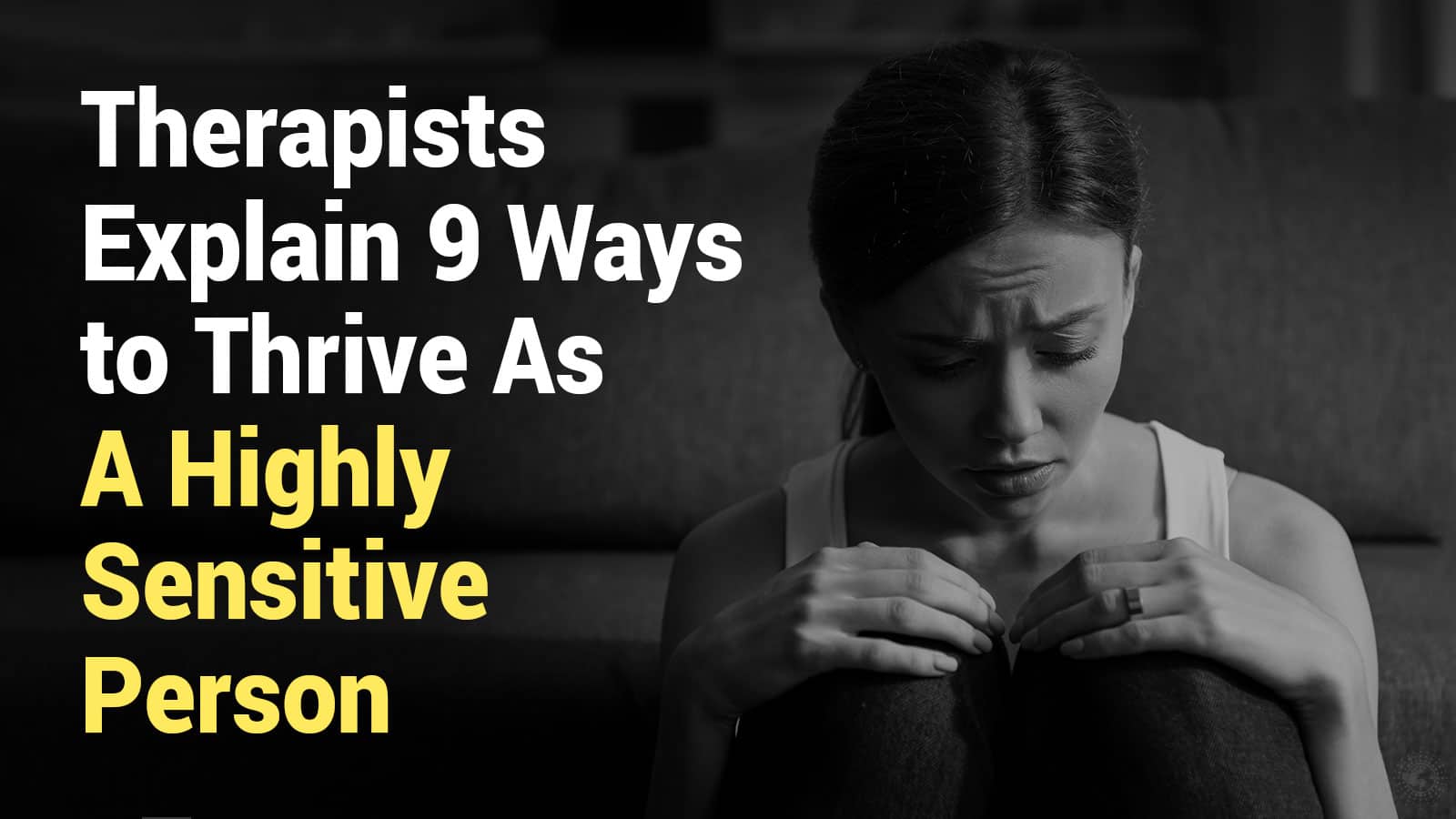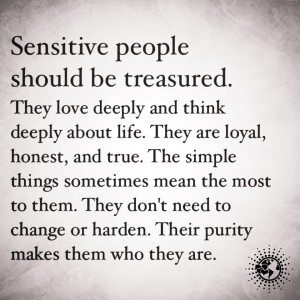If you’re a highly sensitive person in today’s world, you probably feel very misunderstood and out of place. In evolutionary terms, this trait meant life or death for you and the people around you. Because you were more alert and aware of threats, you could respond quickly to danger. However, in the modern world, this trait can often feel like more of a burden than a blessing.
Dr. Elaine Aron, a psychologist who started studying highly sensitive people in 1991, discovered that around 15-20% of the population had this personality trait.
She says that variations in the brain cause highly sensitive people to respond differently to external stimuli. They might become overwhelmed easily by bright lights, loud noises, and fast-paced environments. They need more time to decompress after socializing and thrive in quieter environments. The highly sensitive person also typically has a deep affinity for nature and animals, finding solace in what nature provides.
Since 80% of the population is not highly sensitive, this explains why HSPs often feel so isolated and misunderstood. People might tell you you’re “too sensitive” or that you need to “toughen up.” However, being highly sensitive is a gift that shouldn’t be taken for granted. This trait can allow people to make deeper connections with others and can play a crucial role in surviving tough situations due to heightened awareness.
How to Know if You’re a Highly Sensitive Person
If you think you might have this trait but aren’t sure, you can take a sensitivity test here. The key signs that you might be highly sensitive are:
- You’re easily overwhelmed by strong stimuli, such as bright lights, loud noises, and chaotic environments.
- You have very deep emotions and can easily pick up on others’ feelings too.
- You’re aware of subtle changes in your environment and can usually figure out how to make others around you more comfortable.
- You try hard to avoid violent movies and TV shows.
- You’ll get startled easily.
- You’re startled easily.
- You’re very sensitive to caffeine.
- You’re easily influenced by other people’s moods.
- Your nervous system gets overwhelmed quite easily.
- If you’ve had a busy day, you need a lot of alone time in a darkened or quiet room to recharge.
- You have a hard time accepting criticism.
- You don’t like having to multitask.
- As a kid, people might’ve called you sensitive or shy.
There are more signs of a highly sensitive person, but if you answered yes to most of these, that is a good indicator that you possess the trait yourself.
HSPs feel overwhelmed by too much stimulus
As you can see by this list, these traits don’t often mesh well with our overly stressed, overly stimulated modern world. Many times, HSPs feel overwhelmed and unable to cope with a lot of challenges that the 21st century presents. For example, many highly sensitive people do better working for themselves than someone else because of office politics, bright lights, loud environments, and structured working dynamics. Highly sensitive people prefer to have control over their working situation.
Simply put, the modern world seems too abrasive for many HSPs. With the chaos and stimulation surrounding us, how in the world can highly sensitive people survive? Well, we have a little survival guide for you HSPs out there who feel fed up with modern living and are desperate for some answers.
Therapists explain how highly sensitive people can survive the modern world:
1 – Get enough sleep.
This applies to everyone, but especially HSPs. In Dr. Elaine Aron’s book, The Highly Sensitive Person, she states, “…I find HSPs sometimes do better if they promise themselves to stay in bed for nine hours with their eyes closed without worrying if they are actually sleeping. Since 80 percent of sensory stimulation comes in through the eyes, just resting with your eyes closed gives you quite a break.”
Many people have sleeping problems in today’s world, but for highly sensitive people especially, adequate sleep is vital. Make sure you prioritize sleep and avoid using electronics close to bedtime.
2 – Eat healthy foods throughout your day.
Aron says that HSP’s are more sensitive to hunger pangs and that being hungry can be incredibly disruptive to a sensitive person’s daily routine. With that said, make sure you keep your body happy by bringing snacks with you to work and eating regular meals throughout the day. Eat a variety of fruits veggies, nuts, seeds, grains, and meats/dairy if your dietary preferences allow. Your nervous system will function a lot better if you’re getting a steady supply of vitamins, minerals, and nutrients.
3 – Wear noise-reducing headphones.
In today’s often loud world, many environments are simply too overstimulating for us highly sensitive folks. Luckily, we can make loud environments much more comfortable with noise-reducing headphones. These work by using electronic processing to analyze ambient noise and generating an opposite sound. So, this results in less noise overall. These don’t eliminate noise altogether, but rather make the noise in the environment more tolerable.
This is certainly worth a try, especially for use in places like grocery stores or noisy working environments.
4 – Give yourself downtime.
If your schedule remains packed for days on end and you don’t allow yourself time to unwind, you will likely experience high stress and become more irritable. HSPs, even more than others, need ample time to decompress and get back in tune with themselves. Sensitive people simply have a lower threshold for outside stimuli, so a constantly busy schedule combined with noisy environments and lots of socializing can easily push a highly sensitive person over the edge.
5 – Maintain positive relationships.
Stay away from people who don’t accept or acknowledge your trait. Many people with high sensitivity already feel at a disadvantage in this world, and being around others who are not accepting will only amplify these feelings. Your significant other, friends, and family should all be aware of your sensitivity and love you even more for it. Don’t let others bring you down simply because they don’t understand what makes you beautiful and unique.
6 – Do work that challenges you but doesn’t overwhelm you.
As I said before, many HSPs avoid traditional jobs simply because they don’t thrive in those environments. Many jobs today are overstimulating for the sensitive person’s nervous system, and this doesn’t mean an HSP can’t adapt to it. However, the question isn’t if an HSP can perform a job or not; it’s if the person can actually thrive in that environment. For example, HSPs typically don’t do well in demanding jobs such as sales or management. Some of them excel, but this is not a typical career for an HSP.
Common jobs for people with this trait include massage therapists, therapists, psychologists, scholars, accountants, scientists, artists, writers, and other creative occupations. Also, self-employment is a common route for HSPs.
7 – Limit your caffeine intake.
For people with an overreactive nervous system, caffeine is like adding fuel to a fire. If you’re not sensitive to caffeine, don’t worry about following this tip, but it might be good to try an experiment to see how much better you feel without it. Try weaning yourself off caffeine and then eliminating it altogether for a couple of weeks. You might just find that you feel more relaxed and less wired without caffeine at all.
 8 – Go to stores when they’re the least busy.
8 – Go to stores when they’re the least busy.
Grocery stores and shopping malls can be an HSPs worst nightmare. With the screaming kids, loud music, bright lights, and crowded shops, it doesn’t make for a relaxing experience. However, visiting stores at night or during off-hours can allow for a much less stimulating atmosphere, which will help keep anxiety and overwhelm at bay. Early morning and evening hours are usually the best times for shopping.
9 – Get out in nature as often as you can.
Highly sensitive people need time to decompress in calm, quiet environments. What better way to get back in touch with yourself than spending time in the beauty of nature? Maybe a weekend camping trip or a day off work is just what the doctor ordered. It’s important for HSPs to stay in tune with their bodies and really listen to what it’s telling them. If you’re feeling frazzled and tired from day-to-day life, plan an escape, even if it’s just for a day or two.
Also, keep your home environment as calm as possible. Eliminate distractions and unnecessary stimuli so that when you come home from work each day, you can truly feel like you’ve entered a sanctuary.
Final thoughts about ways to thrive as a highly sensitive person
HSPs often feel overwhelmed and tired in today’s modern world. This is understandable, as much of the way we live today is directly opposite of the way a sensitive person functions. However, taking care of your basic needs and allowing yourself time to unwind will help tremendously. Limiting caffeine, getting out in nature, and arranging your environment in a pleasing way can also work wonders in making you feel more at ease.
















